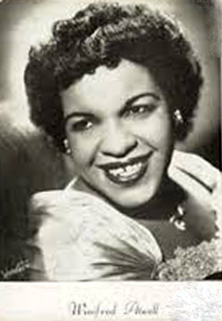Winifred Atwell
Winifred Atwell (27 February 1914 – 28 February 1983) was a Trinidadian pianist who enjoyed great popularity in Britain and Australia from the 1950s with a series of boogie-woogie and ragtime hits, selling over 20 million records. She was the first black person to have a number-one hit in the UK Singles Chart and is still the only female instrumentalist to do so.
Early Life[edit | edit source]
Winifred Atwell was born in Tunapuna, Trinidad and Tobago. She was trained classically in piano from a young age, showing prodigious talent. Initially, she pursued a career in pharmacy, following her parents' wishes, but her passion for music led her to perform professionally, playing at various local events.
Career[edit | edit source]
Atwell's career took off when she moved to London in the 1940s. She studied at the Royal Academy of Music, which honed her classical music skills, but it was her vibrant performances of boogie-woogie and ragtime that captured the public's imagination. Her first major hit was "Black and White Rag" in 1952, which became a staple of her performances and was later used as the theme tune for the BBC's snooker coverage.
Atwell's style included a unique feature: she often performed on two pianos, one of which was a battered "honky-tonk" instrument that became as much her trademark as her music. This piano, known affectionately as her "other piano," helped create a distinctive sound that resonated with audiences.
Throughout the 1950s and 1960s, Atwell had numerous hits, including "Let's Have Another Party" and "The Poor People of Paris," which both reached number one in the UK. Her success was not limited to the UK; she also had significant achievements in Australia, where she moved in the late 1960s and continued to perform and record.
Personal Life[edit | edit source]
Atwell was married to Lew Levisohn, who also served as her manager. They moved to Australia in 1971, where she continued to enjoy success, performing and appearing on television. Despite her international fame, Atwell remained deeply connected to her Trinidadian roots.
Legacy[edit | edit source]
Winifred Atwell's contribution to music, particularly her role in popularizing boogie-woogie and ragtime outside of the United States, is significant. She broke racial and gender barriers in the music industry, achieving levels of success unprecedented for black female artists in her time. Atwell's legacy is celebrated in Trinidad and Tobago and by piano enthusiasts worldwide.
Death[edit | edit source]
Winifred Atwell died on 28 February 1983, just one day after her 69th birthday, in Sydney, Australia. Her music continues to be appreciated by fans old and new, and she is remembered as a pioneering figure in 20th-century music.
Navigation: Wellness - Encyclopedia - Health topics - Disease Index - Drugs - World Directory - Gray's Anatomy - Keto diet - Recipes
Search WikiMD
Ad.Tired of being Overweight? Try W8MD's physician weight loss program.
Semaglutide (Ozempic / Wegovy and Tirzepatide (Mounjaro / Zepbound) available.
Advertise on WikiMD
WikiMD is not a substitute for professional medical advice. See full disclaimer.
Credits:Most images are courtesy of Wikimedia commons, and templates Wikipedia, licensed under CC BY SA or similar.Contributors: Prab R. Tumpati, MD

